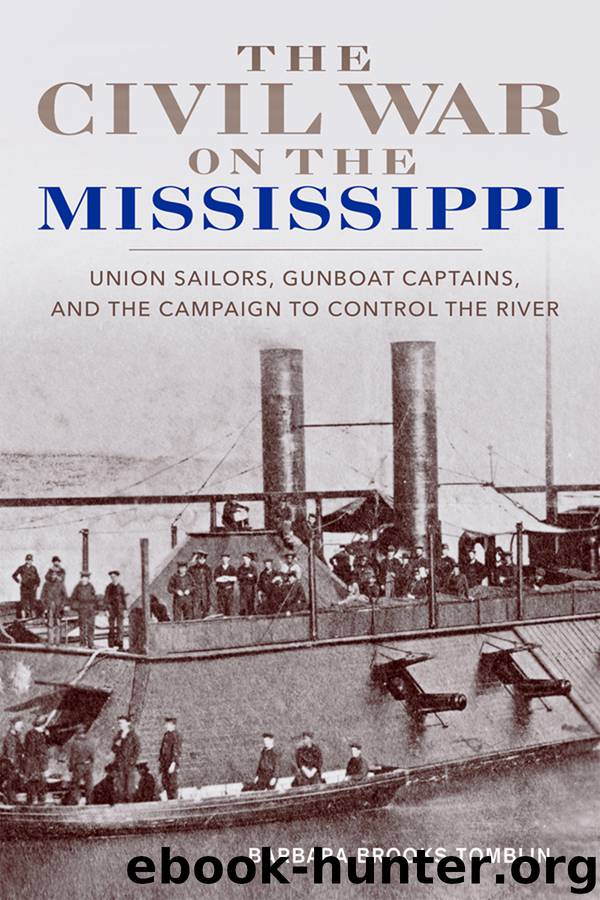The Civil War on the Mississippi by Tomblin Barbara Brooks;

Author:Tomblin, Barbara Brooks;
Language: eng
Format: epub
Publisher: University Press of Kentucky
Published: 2016-02-20T16:00:00+00:00
12
Arkansas Post and Fort Hindman
This was a most beautiful fight.
—David Dixon Porter
“Hail to the New Year,” John Morison wrote in his diary on January 1, 1863. On that very cold morning, the Carondelet and Pittsburg had weighed anchor and started upstream, followed by the Mound City. “We started up to the batteries (7 miles) but owing to a dense fog we did not make much headway, as it was a go-ahead slow, stop, back her all the time.” Suddenly, a tug came in and ordered the gunboats back to the landing. According to Morison, the crew “lay still all day surmising why we were ordered back.” The assault on Drum Gould’s Bluffs, scheduled for 4:00 a.m., had been abruptly canceled.1
The Carondelet remained in the Yazoo, lying off Johnson’s plantation. Later that afternoon a tug came down with orders from Porter. Concerned about reported Confederate activity across the Mississippi from New Madrid, the admiral wanted the ironclad to go up and secure Island No. 10. At about 8:00 p.m. the Carondelet weighed anchor and went down the Yazoo to the Mississippi, “bound for Island 10.”2
The Carondelet proceeded up the Mississippi uneventfully, passing Napoleon, but while steaming close to shore, a boy on the bank hailed the boat. Walke asked what he wanted. “He said that his sister and himself were left alone and they had nothing to eat, whereupon our captain ordered the purser to give him some of his own private stores, ‘for which may his shadow never grow less.’”3
After stopping near Island No. 89 to carry off a few wooden fence rails to use as fuel, the Carondelet continued past the mouth of the White River. The next day Walke ordered the red flag hoisted, indicating that he needed a tow. The tinclad Marmora took the gunboat in tow, and the little Juliet joined them, taking up a hawser. They arrived off Helena at about 8:30 p.m. and tied up to one of the coal barges.4
The Carondelet spent January 8 coaling ship, but at around 3:00 in the afternoon the V. F. Wilson came along to tow the ironclad up the river in yet another effort to conserve the gunboat’s precious coal supply. Thomas Lyons, Walke’s clerk, kept a journal while serving on the Carondelet, and in his entry for January 8 he noted that he had spent some of the evening “studying the President’s message.” News of the Emancipation Proclamation had spread far and wide.5
On Saturday, January 10, the Chillicothe arrived. “She rounded to and Capt. Walke went on board,” Lyons wrote. “All eyes were turned to this new novelty of naval architecture which appeared to be nothing but a scow with a steam engine on board, and a pilot-house with 2 eleven inch guns mounted inside.” The ironclad gunboat’s arrival also provoked a comment from Morison. “In the forenoon we met the new style gunboat ‘Chillicothe’ on her way down to join the fleet. She is the queerest-looking specimen of a war ship that I ever seen. She may be a useful boat but I vow she is not a handsome one.
Download
This site does not store any files on its server. We only index and link to content provided by other sites. Please contact the content providers to delete copyright contents if any and email us, we'll remove relevant links or contents immediately.
| Africa | Americas |
| Arctic & Antarctica | Asia |
| Australia & Oceania | Europe |
| Middle East | Russia |
| United States | World |
| Ancient Civilizations | Military |
| Historical Study & Educational Resources |
1861 by Adam Goodheart(1049)
Smithsonian Civil War by Smithsonian Institution(1009)
Abraham Lincoln: A Life, Volume 2 by Michael Burlingame(969)
The Fiery Trial by Eric Foner(940)
Battle Cry of Freedom by James M. McPherson(935)
Ulysses S. Grant by Michael Korda(933)
Rock of Chickamauga(926)
Rebel Yell: The Violence, Passion, and Redemption of Stonewall Jackson by S. C. Gwynne(917)
101 Things You Didn't Know About Lincoln by Brian Thornton(909)
Abraham Lincoln in the Kitchen by Rae Katherine Eighmey(862)
This Republic of Suffering: Death and the American Civil War by Drew Gilpin Faust(834)
Bloody Engagements by John R. Kelso(821)
Lincoln's Lieutenants by Stephen W. Sears(806)
Union by Colin Woodard(800)
Leaves of Grass by Walt Whitman(797)
The escape and suicide of John Wilkes Booth : or, The first true account of Lincoln's assassination, containing a complete confession by Booth(766)
1861: The Civil War Awakening by Adam Goodheart(747)
Rise to Greatness by David Von Drehle(734)
The Fiery Trial: Abraham Lincoln and American Slavery by Eric Foner(722)
